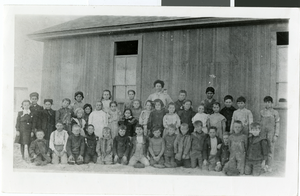Search the Special Collections and Archives Portal
Search Results
Emmell J. Beech oral history interview
Identifier
Abstract
Oral history interview with Dr. Emmell J. “E. J.” Beech conducted by Salvatore Maranto on November 27, 2006 for the Public School Principalship Oral History Project. In this interview, Dr. Beech reflects upon his career as an elementary and middle school teacher and administrator in California. He discusses how he entered education, his experiences desegregating schools in multiple school districts, and his approach to school administration.
Archival Collection

Photograph of school and school children, Las Vegas, circa 1908
Date
Archival Collection
Description
Image
Belia C. Cruz oral history interview
Identifier
Abstract
Oral history interview with Belia C. Cruz conducted by Janel Houldsworth on October 25, 2004 for the Public School Principalship Oral History Project. In this interview, Cruz reflects upon her career as an elementary school teacher and principal in Imperial County, California from the 1970s to the 1990s. She discusses her upbringing, and how her family influenced her involvement with programs such as Head Start, and how this translated into a teaching career. She describes the process by which she eventually became a principal, and her work in bilingual education. She also offers her stance on the contemporary status of the education system, and the standing of bilingual education in the Clark County School District (CCSD). She concludes by describing her experience as a substitute teacher in CCSD, and her involvement with bilingual education.
Archival Collection
Dean Otteson oral history interview
Identifier
Abstract
Oral history interview with Dean Otteson conducted by Felicia McCabe on November 04, 2008 for the Public School Principalship Oral History Project. In this interview, Otteson reflects upon his experiences as a teacher and administrator in Alaska and with the Department of Defense Dependent Schools. He discusses his experiences working with vocational training, working with assistant principals, and challenges that he faced.
Archival Collection

Transcript of interview with Rosemary (Conner) Cleman by Beatrice Owens (Gillard), March 8, 1981
Date
Archival Collection
Description
Text
James Perkins oral history interview
Identifier
Abstract
Oral history interview with James Perkins conducted by Janel Houldsworth on June 22, 2005 for the Public School Principalship Oral History Project. In this interview, Perkins reflects upon his career as a teacher and administrator with Nevada’s Clark County School District (CCSD). He describes the process by which he chose to pursue special education, and eventually became a teacher and administrator at several elementary and special education schools throughout the school district. He discusses issues such as student and staff diversity, and his interactions with Native American students through the development of Ute V. Perkins Elementary School in Moapa, Nevada. He also describes his approach to school administration, and his daily routine as a principal.
Archival Collection

Transcript of interview with Lydia Berry by Kathy Zeller, February 22, 1979
Date
Archival Collection
Description
Text
Walter V. Long oral history interview
Identifier
Abstract
Oral history interview with Walter V. Long conducted by Brenda Baechle on February 19, 1979 for the Ralph Roske Oral History Project on Early Las Vegas. In the interview, Long discusses his arrival to Las Vegas, Nevada from Tonopah, Nevada in 1930. Long also discusses his experiences as a teacher and principal in various Las Vegas schools. Other subjects Long discusses include his education, the Boulder (Hoover) Dam's construction, laws for obtaining a teaching certificate during the 1930s, his experiences with Las Vegas High School, and his early life in Tonopah.
Archival Collection
Julie Rae Kasper oral history interview
Identifier
Abstract
Oral history interview with Julie Rae Kasper conducted by John Barela on April 08, 2005 for the Public School Principalship Oral History Project. In this interview, Kasper reflects upon her career as a teacher and school administrator in Pennsylvania and Illinois during the 1980s and 1990s. She discusses how she started volunteering to teach special education when she was in eighth grade, and how this experience inspired her to become a teacher. She then describes the process by which she served as an elementary school principal in the Waukegan School District in Illinois and worked with early childhood special education programs. She discusses her approach to educational leadership, how her approach has changed over the years, and responsibilities that she faced as principal. She also compares working in the Waukegan School District with working in the Clark County School District (CCSD), and describes the different approaches of each school district.
Archival Collection

